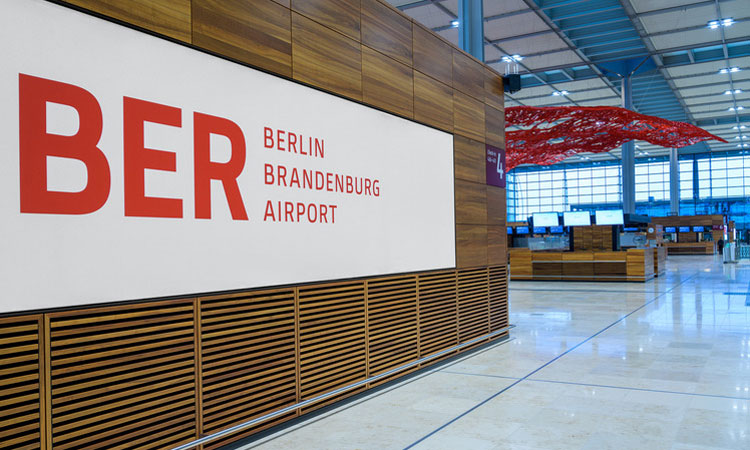BER Airport expects to reach pre-pandemic passenger levels by 2025
- Like
- Digg
- Del
- Tumblr
- VKontakte
- Buffer
- Love This
- Odnoklassniki
- Meneame
- Blogger
- Amazon
- Yahoo Mail
- Gmail
- AOL
- Newsvine
- HackerNews
- Evernote
- MySpace
- Mail.ru
- Viadeo
- Line
- Comments
- Yummly
- SMS
- Viber
- Telegram
- Subscribe
- Skype
- Facebook Messenger
- Kakao
- LiveJournal
- Yammer
- Edgar
- Fintel
- Mix
- Instapaper
- Copy Link
Posted: 26 January 2021 | International Airport Review | No comments yet
Should the post-pandemic prediction be correct, a total of roughly 83 million fewer passengers would fly from BER between 2021 and 2025 than originally expected.


Credit: Berlin Brandenburg Airport
The drastic impacts of the COVID-19 pandemic on the development of global air traffic and, therefore, also on the economic situation of Flughafen Berlin Brandenburg GmbH and the basis for its 2021 business plan were discussed by the company’s Supervisory Board on 25 January 2021.
The Executive Board reported to the Supervisory Board that passenger traffic remains at its lowest level because of the global pandemic. On average, around 7,500 passengers were handled daily at Berlin Brandenburg Willy Brandt Airport (BER) in the first weeks of January 2021, which is only around 10 per cent of 2020’s level.
Like all other German airports, the airport company generally expects air traffic to recover only slowly. According to their estimates, only just under a third of the volume in 2019 can be achieved during 2021, with 10.7 million passengers.
Many airlines have significantly reduced their fleets, cut jobs and are repositioning themselves on the market. Travel restrictions generally lead to considerable planning uncertainty in the entire aviation industry. The result is that medium and longer-term development can currently only be roughly estimated.
For this reason, the airport company’s Executive Board presented the Supervisory Board with three possible scenarios for when the pre-crisis level of 35.6 million in 2019 can be achieved again: In the best case, this would be possible by 2023; the worst case would be in 2027.
The development crucially depends on: When the vaccines are globally and extensively available; when quarantine regulations are relaxed or lifted; and how quickly the economy recovers.
As the Executive Board informed the Supervisory Board, it is considering a middle scenario as the basis for the business plan. According to this, reaching the pre-pandemic level in 2025 is the most realistic prediction. Passenger growth could then return to one to two per cent, annually.
If this projection is correct, a total of around 83 million fewer passengers would fly from BER Airport between 2021 and 2025 than originally expected. This also involves considerable economic losses.
The Executive Board also gave the Supervisory Board a detailed report on planned savings over the next few years. Among other things, this includes delaying investments for the structural expansion of BER Airport, strict expenditure control and reorganising the personnel structure. Special projects, such as the temporary decommissioning of Terminal 5 or suspending the use of the southern runway, also make significant contributions to reducing costs.
However, the planned savings will not be enough to compensate for the coronavirus-related loss of turnover. Consequently, Flughafen Berlin Brandenburg GmbH is reliant on the renewed support of its shareholders and partial debt relief to maintain its capital market viability.
Rainer Bretschneider, Chairman of the Supervisory Board of Flughafen Berlin Brandenburg GmbH, said: “We are satisfied with operations at Berlin Brandenburg Willy Brandt Airport so far. Processes are running steadily and coming together, not considering the usual teething problems that come with a major construction project. Unfortunately, the economic situation of the airports in Germany is still very critical because of the pandemic, and a recovery is still a long way off. That is why we are now focusing on the finances after the commissioning and, in doing so, on the economic activities of the company.”
Chief Executive Officer of Flughafen Berlin Brandenburg GmbH, Engelbert Lütke Daldrup, said: “Travel restrictions will only be eased or lifted when a vaccine against the coronavirus is globally and extensively available. Therefore, the airport company only expects air traffic to recover to pre-crisis levels in 2025. As a company, we will make every effort to work as cost-effectively as possible until then. We will have to cope with painful cuts as a result. We will continue to rely on the support of our shareholders until we have reached pre-coronavirus levels.”
Related topics
Related airports
Related organisations
Related regions
Related people
Prof. Dr.-Ing. Engelbert Lütke Daldrup, Rainer Bretschneider


















